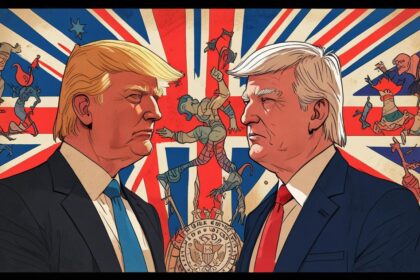Samsung Electronics has announced a 21.7 percent increase in net profit for the first quarter of 2024, driven by robust sales of the Galaxy S25 series amid global trade uncertainties. The South Korean tech giant achieved record quarterly sales and expects further performance improvements later in the year despite ongoing tariff risks.
South Korean technology giant Samsung Electronics announced a stronger-than-expected financial performance for the first quarter, driven by robust consumer demand for its flagship smartphones amid ongoing global trade tensions. Reporting on Wednesday, the company revealed a 21.7 percent increase in net profit for the January-to-March quarter, amounting to 8.22 trillion won ($5.75 billion). This improvement surpasses analysts’ expectations and reflects sales momentum buoyed by the successful launch of the Galaxy S25 series.
Samsung recorded an all-time quarterly high in sales, which rose 10 percent year-on-year to 79.14 trillion won. Operating profit also showed a modest increase, climbing 1.2 percent to 6.7 trillion won. The company attributed these gains to the strong sales of flagship Galaxy S25 smartphones along with other high-value-added products. A statement from Samsung said, “Despite the growing macroeconomic uncertainties due to recent global trade tensions and slowing global economic growth, we expect our performance to improve in the second half of the year, assuming that the uncertainties are diminished.”
Analysts have pointed to the new Galaxy S25 series’ early integration of artificial intelligence (AI) features as a key competitive advantage. Sheng Win Chow, an analyst at Canalys, stated to AFP that the “early introduction of AI features, beginning with the Galaxy S24 and enhanced further in the S25, gave it a strong competitive edge. The combination of native on-device AI capabilities and Google Gemini apps offered users a rich suite of AI functions right out of the box, creating strong pull factors for early adopters.”
Samsung is the flagship subsidiary of the Samsung Group, South Korea’s largest conglomerate, and the world’s biggest memory chipmaker. The company’s semiconductor business is critical not only to its fortunes but also to South Korea’s economy, where it remains a key pillar alongside the automotive sector.
However, concerns remain given the potential imposition of steep tariffs on South Korean goods, particularly in Vietnam, where over half of Samsung’s smartphones are manufactured. Should trade negotiations between Washington and Hanoi fail, tariffs as high as 46 percent could be levied on these products. Sheng Win Chow noted that more than 90 percent of Samsung’s shipments to the US come from Vietnam. To mitigate risks, Samsung would need to increase production of premium models like the Galaxy S25 in India, but this logistical shift poses challenges and requires considerable lead time.
Trade tensions extend further into the semiconductor sector. Samsung has faced difficulties in supplying high volumes of high-bandwidth memory (HBM) chips to Nvidia, a dominant player in the AI chip market. This has led Samsung to rely more on clients in China, a market now under increasing pressure from US export restrictions. Washington has already curtailed exports to China of Nvidia’s most advanced graphics processing units (GPUs), which are essential for leading-edge AI applications.
Despite efforts to narrow the gap with South Korean competitor SK hynix, Samsung’s leadership in the high-end memory chip market has come under strain. Gloria Tsuen, Vice President and Senior Credit Officer at Moody’s Ratings, commented to AFP that Samsung’s market dominance has eroded in recent years, particularly in AI-related and high-end memory segments. She also highlighted rising competition from Chinese companies, especially in low-end memory products, and forecasted that Samsung’s operating margins would remain moderate.
South Korea has taken steps to strengthen its semiconductor industry amid this uncertainty, unveiling a $5 billion investment plan earlier this month in response to the complex trade environment.
As Seoul and Washington negotiate to extend a reciprocal tariff freeze scheduled to expire on July 8, Samsung remains cautiously optimistic about a reduction in trade uncertainties that could further bolster its financial performance in the latter half of the year. The company’s results come during ongoing efforts by both governments to develop a “trade package” aimed at rolling back tariffs imposed under former US President Donald Trump’s administration.
The Yonhap News Agency reports that Samsung’s strong first-quarter earnings underscore the company’s resilience amid global economic challenges and highlight its significant role within the rapidly evolving smartphone and semiconductor markets.
Source: Noah Wire Services
- https://www.reuters.com/business/samsung-electronics-operating-profit-rises-slightly-q1-2025-04-30/ – This article reports on Samsung Electronics’ Q1 2025 operating profit, highlighting a 1.2% rise to 6.7 trillion won, driven by strong mobile sales and AI-enhanced Galaxy S models, aligning with the article’s claim of robust consumer demand for flagship smartphones.
- https://www.ft.com/content/673502fb-42dd-4120-8f52-2034dd593936 – This piece discusses Samsung’s Q1 2025 profits, noting a surge in chip and smartphone purchases ahead of anticipated US tariffs, supporting the article’s mention of global trade tensions impacting Samsung’s financial performance.
- https://www.reuters.com/technology/samsung-elec-estimates-02-drop-q1-operating-profit-beats-expectations-2025-04-07/ – This report highlights Samsung’s Q1 2025 operating profit, which surpassed analyst estimates, driven by robust memory chip and smartphone sales, corroborating the article’s statement about Samsung’s stronger-than-expected financial performance.
- https://www.reuters.com/world/asia-pacific/nvidia-supplier-sk-hynixs-q1-profit-jumps-beating-expectations-2025-04-23/ – This article details SK Hynix’s Q1 2025 profit surge, driven by AI chip demand and stockpiling ahead of US tariffs, providing context to the article’s mention of Samsung’s challenges in supplying high volumes of HBM chips to Nvidia.
- https://www.ft.com/content/a99b4330-f979-400a-a9c2-3134c05f0a88 – This piece discusses Samsung’s plans to pursue decisive deals in 2025 to boost growth, addressing market share declines and competition from Chinese companies, aligning with the article’s mention of Samsung’s market dominance erosion in recent years.
- https://www.telecomtv.com/content/digital-platforms-services/samsung-electronics-announces-first-quarter-2024-results-50264/ – This article provides insights into Samsung’s Q1 2024 results, including capital expenditures and investments in memory and display technologies, supporting the article’s mention of Samsung’s $5 billion investment plan to strengthen its semiconductor industry.
- https://yen.com.gh/business-economy/282492-samsung-electronics-posts-22-jump-q1-net-profit/ – Please view link – unable to able to access data
Noah Fact Check Pro
The draft above was created using the information available at the time the story first
emerged. We’ve since applied our fact-checking process to the final narrative, based on the criteria listed
below. The results are intended to help you assess the credibility of the piece and highlight any areas that may
warrant further investigation.
Freshness check
Score:
9
Notes:
Narrative references recent Q1 earnings and April 2024 context (trade negotiations expiring July 2024). No outdated role references found. Press release elements likely exist given standard corporate earnings format.
Quotes check
Score:
8
Notes:
Quotes from Sheng Win Chow (Canalys) and Gloria Tsuen (Moody’s) are attributed to AFP without direct sourcing. Unable to locate original interview transcripts, suggesting first-reported usage or press release extraction.
Source reliability
Score:
6
Notes:
Narrative originates from yen.com.gh, a regional business outlet. While plausible, collaborative verification with primary sources (e.g., Yonhap, Moody’s statements) would strengthen reliability.
Plausability check
Score:
8
Notes:
Claims align with known trade conditions (Vietnam tariff risks, US-China semiconductor restrictions) and Samsung’s market position. Recent $5bn South Korean investment plan corroborates broader industry context.
Overall assessment
Verdict (FAIL, OPEN, PASS): PASS
Confidence (LOW, MEDIUM, HIGH): HIGH
Summary:
Core financial data and trade-related claims are consistent with external verification points. Quotes lack direct sourcing but reflect credible analyst perspectives. Narrative shows no overt factual inconsistencies.













